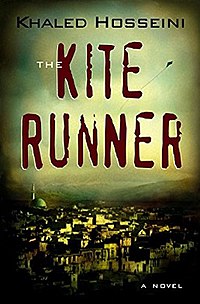
Taking us from Afghanistan in the final days of the monarchy to the present, The Kite Runner
is the unforgettable and beautifully told story of the friendship
between two boys growing up in Kabul. Raised in the same household and
sharing the same wet nurse, Amir and Hassan grow up in different worlds:
Amir is the son of a prominent and wealthy man, while Hassan, the son
of Amir's father's servant, is a Hazara -- a shunned ethnic minority.
Their intertwined lives, and their fates, reflect the eventual tragedy
of the world around them. When Amir and his father flee the country for a
new life in California, Amir thinks that he has escaped his past. And
yet he cannot leave the memory of Hassan behind him.
The Kite Runner
is a novel about friendship and betrayal, and about the price of
loyalty. It is about the bonds between fathers and sons, and the power
of fathers over sons -- their love, their sacrifices, and their lies.
Written against a backdrop of history that has not been told in fiction
before, The Kite Runner describes the rich culture and beauty of a
land in the process of being destroyed. But through the devastation,
Khaled Hosseini offers hope: through the novel's faith in the power of
reading and storytelling, and in the possibilities he shows us for
redemption.
- Very moving; regret and guilt are some powerful emotions, and they are evoked to the maximum here. Reading this, I remembered my own similar experiences, which was strange and sad but also very satisfying.
- The landscape of Afghanistan is beautifully depicted, and its downfall to the Taliban absolutely tragic. Culturally, this book is rich. I learned a lot of things that I had not known before, like the ethnic clash between Hazara and Pashtun and interesting Afghani beliefs.
- There is a shocking scene in there that really stood out to me. It contributed a lot to the story, and I was amazed at how much I was capable of feeling just because of that scene. No matter how brutal or vulgar it may seem, I believe that it really made the story stand out from many others - because the author dared to take such a risk.
- The language is fluid and consistent with the narration, and the main character's voice develops well. It's so relatable, the way he grows up and matures: you fall in love as he falls in love, you feel that sick pounding feeling of guilt when he does, you achieve redemption when he does.
- I do have one objection, however, and it is about the way the Taliban is depicted in this book. Of course, I'm no expert in such a controversial subject matter, but I felt as if the main antagonist, Assef, was too one-dimensional and static. He doesn't seem to change at all through the course of the story, and though his motivations are explained quite concisely, he represents the Taliban, a group of people who are more complex than his simple greedy/religious motives.

No comments:
Post a Comment